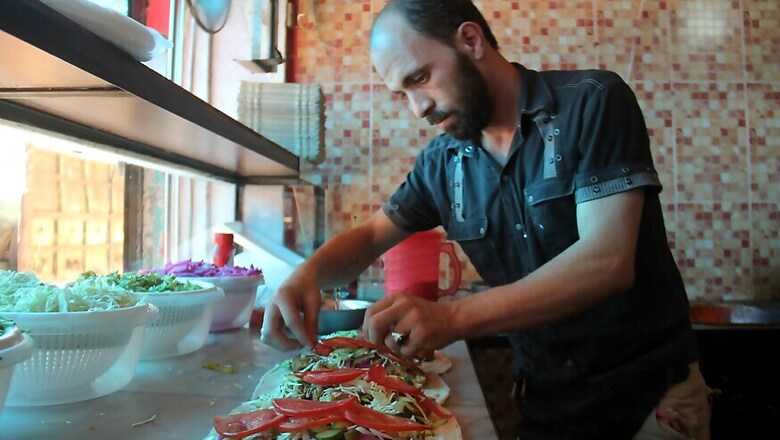
views
On a bustling street in northwest Syria, young restaurateur Abdulrahim Abulezz serves up juicy chicken wraps crafted according to a traditional recipe from his hometown Daraya, which he left last year. His restaurant Sultan Daraya sits in a row of shops and eateries run by Syrians who quit their formerly rebel-held towns around the capital Damascus under deals with the regime.
With names like Madaya Supermarket and Ibad al-Rahman's Damascene Delicacies, the shops have turned this quarter of rebel-controlled Idlib into a "Little Damascus."
Sultan Daraya's sandwiches are a particular hit among those missing a taste of home. "We named it 'Sultan Daraya' because that's where we came from," said 24-year-old Abulezz, the restaurant's enterprising owner. His speciality is the mouth-watering shawarma sandwich, filled with chicken roasted on a vertical spit and shaved onto a bed of pita bread stuffed with tomatoes, spicy peppers and special sauces.
"We bring the spices and prepare our traditional Damascene hot sauce. That's why our shawarma is distinctly Damascene," Abulezz said proudly. "We even add a Damascene marinade to the roasted chicken -- a secret recipe that no one knows here." The blend hails from his family's restaurant in Daraya, one of the first towns to revolt against Syria's government when protests broke out in 2011. At the time, Abulezz left university to join rebels defending Daraya, which soon came under crippling government siege.
But in August 2016, he was among thousands of fighters and civilians bussed out of the town to opposition-held Idlib after a settlement with the regime. Tens of thousands of people have been displaced to Idlib province under similar "reconciliation" deals ending government siege and bombardment in exchange for rebels and other residents leaving.
About two months ago, Abulezz opened up Sultan Daraya in Idlib city. He now boasts seven employees: five from Daraya, and another from Homs, another city which the government also recaptured after rebel evacuations, and Abu Ali, from Eastern Ghouta near Damascus.
As he shaved chicken slices from the spit, 25-year-old Abu Ali crooned a nostalgic ode to Damascus. "Most of my customers are people from Madaya, Zabadani, Daraya, and Moadamiyet al-Sham," Abulezz said, listing towns around Damascus under "reconciliation" deals. "Everyone from the capital's suburbs has chased these Damascene specialties," he said.
Indeed, Daraya natives were flocking to Abulezz's restaurant on the day of AFP's visit. Abu Hamdan, a furniture seller living in Atmeh near the border with Turkey, said he eats at Sultan Daraya "just to remember the smell of Damascus. Coming to these restaurants reminds us of Daraya, of its people and their food. Being displaced is like sucking the soul out of the body," the 50-year-old said.
Carpenter Abu Imad, 50, is also a regular visitor. I come to Idlib city every time I need to buy some merchandise, so we drop by friends from our hometown," Abu Imad said. "I don't have a favourite dish. I come here to remember, to go back to the good old days of Daraya."
Along the same street lies Ibad al-Rahman's Damascene Delicacies, which dishes out hummus, fava beans drizzled in olive oil, and deep-fried falafel. The owner, 22-year-old Mohammad Nuh, also imported his succulent recipes from his family's restaurant in Daraya. "When I was 10, my father had a restaurant in Daraya. My brothers and I used to work there, which is where I learned the trade," he told AFP, adding "I prepare the food here the exact same way." Inside, his three employees are cubing fresh tomatoes, chopping parsley bouquets, and dipping mashed chickpea mixtures into sizzling olive oil to make falafel. "I had to go into debt to open up this restaurant. It took a lot of hard work, but finally I have my own place," Nuh said, while noting, "It was a coincidence that we all ended up on this street. Most of us didn't know each other before, but we opened several different businesses."
Just like Sultan Daraya, Nuh's restaurant attracts customers whose palates are used to Damascene flavours. "Idlibis love hot sauce so much -- they put it on everything. This ruins the food," Nuh said. "We're introducing them to new recipes so they can actually taste the dish and its ingredients." One regular is Abu Mukhtar, who hails from Madaya, another town near Damascus that has been evacuated. "We Damascenes are known for our love of good food, which we always found in local restaurants in Daraya, Madaya, or other areas in the suburbs," said Abu Mukhtar. The lanky, silver-haired Syrian teamed up with other Madayans to establish a supermarket named after their beloved hometown. "We decided with neighbouring businesses also owned by displaced people that we'll shop at each others’ places for mutual benefit."

















Comments
0 comment